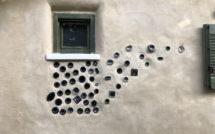
Thesis Trajectories and PhD Defenses in Times of COVID-19: Is it Different This Time?

This is part of our Campus Spotlight on Maastricht University.
During the summer of 2020, academic staff and students alike have had to face various degrees of a COVID-19 lock-down. What impact has this had on how undergraduate, Masters, and PhD theses were written, supervised, and delivered during that time and what are implications for the university at large? At the University of Maastricht, it has emerged that around 75 percent of students enrolled in the Bachelor of European Studies (BA-ES) at the Faculty of Arts and Social Sciences (FASoS) did submit their thesis on time. However, a greater number of deadline extensions were granted than usual, as a consequence of students successfully invoking the COVID-19 hardship clause, which has allowed students to submit a motivated request to the Examinations Board, explaining why the pandemic led to a study delay.
The reasons for non-submission were manifold and often personal. At first sight, my own cohort of students were luckily not directly affected by the pandemic and nor were their families. But COVID-19 exacerbated processes that were already at play before the virus came about, such as absences or unresponsiveness in communications. Some students struggled with their topics and their approaches at the outset of the thesis trajectory. It did not help that they had to move back to families’ or friends’,’ often having to cross over several national borders. Routines of studying with others at the library or cafés were disrupted, depriving some students the extra push they needed to deliver their work. The quality of contributions submitted also suffered with some students failing or having to revise their theses over the summer. The uncertainty linked to the corona virus also seems to have had an impact on students’ motivation and capacity to work on a piece for a sustained period of time.
The thesis supervision process was also severely impacted. At Maastricht University, students who enroll in the BA-ES sign up to work on one topic related to their supervisor’s expertise. The process involves frequent face to face meetings between supervisors and individual students, where support and guidance are provided, as well as group meetings. In particular, supervisors provide guidance on “meta” issues such as research design and use of methodological approaches. While meetings could still be held virtually, the “group” feeling of ”we are in this together” was obfuscated as students sat behind screens. It is also not easy to do a tour de table as we would normally do. As a result, most of the supervision was held on an individual basis and online. Somehow, I found that it was more difficult to get my points across. Some of my comments got lost in translation and were not picked up by the students and I could not tell if students were even taking notes. Nonetheless, some students handled the unusual circumstances well and delivered very good work. Overall, experiences were a mix, but for students facing difficulties with writing and conceptualizing issues, the virtual environment was surely an impediment.
In order for BA-ES students to get additional feedback and guidance from other fellow students and staff members that are not their supervisors, we also usually organize an annual European Studies thesis conference in June. This year, it had to be held online via Zoom. It was less well attended than in previous years (by about ten to fifteetn students less). The conference is an opportunity for academic staff to meet students who work on issues related to their field of expertise (in my case, EU democratic governance). Although, it was impressive to see how efficient and concise students were at presenting highly complex issues on EU governance and how confident students were about their topic and research, those who struggled were left behind. Under normal circumstances, academic staff could have better reached out to these students after the conference. This year, the interaction ended when participants logged off.
Master’s students in European Public Affairs (EPA-Master) also had to adapt quickly to the “new normal.” For example, students doing an internship at a consultancy firm or at a member state regional representation office in Brussels is an integral part of the Master’s experience. This year, a large number of internships were cancelled. Staff had to come up with creative ways for students to nevertheless submit internship reports and internship theses. When an internship fell flat, students still had to reflect on the type of work they expected they would have done during their internship. They were also asked to, for example, compare the confinement/lock-down measures that two EU member states took as a reaction to COVID-19, in order to see whether there were similarities and assess whether there seemed to be a coherent approach across the EU. Some students were able to do their internships, but the nature of the work was substantially different from what it would have been during a usual internship. Also, conferences that were to be organized took place online, if at all. Instead of working at the office and being able to network, students had to work remotely from their apartments. A new section was added in the internship reports that asked students to reflect on the ways in which the pandemic impacted their work(flow). In the end, some students delivered excellent work and managed to do a plethora of interviews with stakeholders, for example with the representations of Dutch provinces in Brussels, albeit all online.
Not only did Bachelor’s and Master’s theses have to be handed in during coronavirus times, but PhD theses also had to be defended. What to do? Like their counterparts all over the world, Maastricht University PhD candidates had to defend online the work that they had painstakingly drawn up over several years. One of the PhD students I (co-)supervised was the first to defend online at our Faculty of Arts and Social Science (FASoS). She wrote her PhD on the transnational cooperation of political groups within EU affairs. I was probably more nervous than she was. I was anxious that my Zoom connection would crash in the middle of my laudatio (appraisal speech). I was also faced with the question of how to make my home look serious enough for such an important occasion. After much thought, I placed the computer on a towel rack in front of a bookshelf. The candidate herself defended from her kitchen table, but made it look like she was reporting from a European Council summit.
After that defense went without a hitch, I thought that it was better not to jinx anyone’s luck and leave it at that. But another defense came up at the University of Utrecht. This time I was part of the “Corona,” which is the name of the “crown,” or group of professors, questioning the PhD candidate. This one was a hybrid defense, in that the PhD candidate and his supervisors (and other professors working at his home University) were present physically together at the university and only the “external” professors joined the defense online. Although there were hardly any technical problems, this hybrid approach could be called a “two-tier society.” While the host of professors present at the University socialized before the defense and could attend the reception afterwards, those present only online were excluded after the defense, left alone in front of their towel racks, desks, or kitchen tables. How fitting was it that the successful PhD candidate dealt with the topic of “trilogues:” closed door meetings between the European Council, the European Commission, and the European Parliament (EP)?
All in all, this time was definitely a different experience. On the one hand, the topics students covered were not new as such, but the approaches, questions and angles of scrutiny were refreshing and brought new perspectives to light. On the other hand, the conditions under which we had to work were new, unexpected, and characterized by a great degree of uncertainty.
What are some implications for academia in general and for universities in particular? We can draw conclusions both for the process of supervision and for working in times of crisis. When it comes to process, personal contact seems to be key, even when it comes to thesis writing. Explaining the way forward when students are stuck or have queries seems to fall on more fruitful ground when this is done in person than when this takes place online. Nevertheless we should cherish the online tools we have at hand as otherwise we would be voiceless during the lockdown (and beyond). When it comes to crises, we see that these—and here the Pandemic is no exception—exacerbate processes. For those that found the thesis trajectory challenging from the beginning, the crisis made it ever more so. It also shows that working in a consistent manner goes a long way. Leaving certain tasks for the last minute does not work well when a crisis hits as you have little to build on.
Christine Neuhold is full Professor of EU Democratic Governance. Her research and teaching focus on questions of accountability within networked systems of governance. She has been supervising theses for around twenty years on a wide range of topics relating to EU affairs. As of September1st, 2020, she has been appointed Dean of the Faculty of Arts and Social Sciences at Maastricht University.
Photo: On the table are the books and protections against the Covid-19 and in the background is the young woman working on the computer | Shutterstock
Published on November 10, 2020.




